Related Research Articles

Roberta Joan "Joni" Mitchell is a Canadian-American singer-songwriter, multi-instrumentalist, and painter. As one of the most influential singer-songwriters to emerge from the 1960s folk music circuit, Mitchell became known for her personal lyrics and unconventional compositions which grew to incorporate pop and jazz elements. She has received many accolades, including eleven Grammy Awards and induction into the Rock and Roll Hall of Fame in 1997. Rolling Stone called her "one of the greatest songwriters ever", and AllMusic has stated, "Joni Mitchell may stand as the most important and influential female recording artist of the late 20th century."

"A Day in the Life" is a song by the English rock band the Beatles that was released as the final track of their 1967 album Sgt. Pepper's Lonely Hearts Club Band. Credited to Lennon–McCartney, the opening and closing sections of the song were mainly written by John Lennon, with Paul McCartney primarily contributing the song's middle section. All four Beatles played a role in shaping the final arrangement of the song.

Face the Music is the fifth studio album by Electric Light Orchestra (ELO). It was released in September 1975 by United Artists Records and on 14 November 1975 in the United Kingdom by Jet Records. The album moves away from the large-scale classical orchestrated sound of the previous album, Eldorado, in favour of more "radio-friendly" pop/rock songs, though the string sections are still very prominent. The new sound proved successful for the group, for Face the Music was the first ELO album to go platinum.

After the Gold Rush is the third studio album by the Canadian-American musician Neil Young, released in September 1970 on Reprise Records. It's one of four high-profile solo albums released by members of folk rock group Crosby, Stills, Nash & Young in the wake of their chart-topping 1970 album Déjà Vu. Young's album consists mainly of country folk music along with several rock tracks, including "Southern Man." The material was inspired by the unproduced Dean Stockwell-Herb Bermann screenplay After the Gold Rush.

"Woodstock" is a song written by Canadian-American singer-songwriter Joni Mitchell. At least four notable versions of the song were released in the same year, 1970. Mitchell's own version was first performed live in 1969 and appeared in April 1970 on her album Ladies of the Canyon and as the B-side to her single "Big Yellow Taxi". This publication was preceded by Crosby, Stills, Nash & Young's cover version, which appeared on their March 1970 album Déjà Vu and became a staple of classic rock radio and the best-known version in the United States. A third version, by the British band Matthews Southern Comfort became the best known version in the United Kingdom, and was the highest charting version of the song, reaching the top of the UK singles chart in 1970. A fourth version by studio project The Assembled Multitude also became a chart hit.

Ladies of the Canyon is the third studio album by Canadian singer-songwriter Joni Mitchell, released on Reprise Records in 1970. It peaked at No. 27 on the Billboard 200, and has been certified platinum by the RIAA. The title makes reference to Laurel Canyon, a center of popular music culture in Los Angeles during the 1960s, where Mitchell lived while she was writing the album. Specifically, Mitchell lived and wrote at 8217 Lookout Mountain Avenue, the house which is the subject of Graham Nash's "Our House". The album includes several of Mitchell's most noted songs, such as "Big Yellow Taxi", "Woodstock" and "The Circle Game".
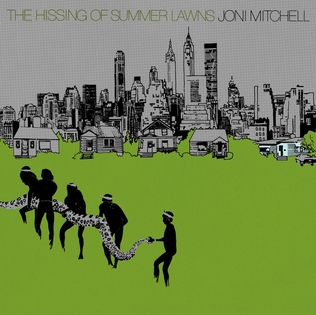
The Hissing of Summer Lawns is the seventh studio album by Joni Mitchell. It was released in November 1975 on Asylum Records. The album continues the jazz-influenced sound of Mitchell's previous album Court and Spark while featuring more unconventional and experimental material than its predecessor. Additionally, the album saw Mitchell experiment with sampling and synthesizers such as the Moog and ARP. Contributors to the album include jazz-rock groups the L.A. Express and the Jazz Crusaders alongside backing appearances by James Taylor, David Crosby, and Graham Nash.
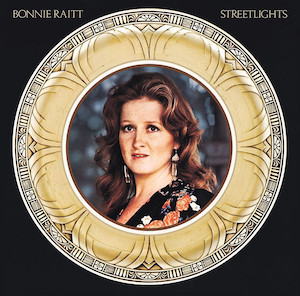
Streetlights is the fourth album by Bonnie Raitt, released in 1974.
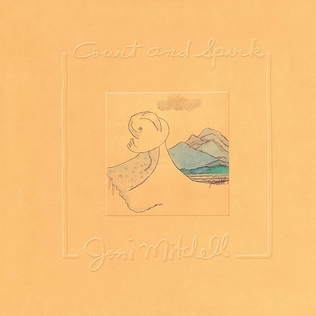
Court and Spark is the sixth studio album by Canadian singer-songwriter Joni Mitchell. Released in January 1974, it infuses the folk rock style of her previous albums with jazz elements.

Both Sides Now is a concept album and studio album by Canadian singer-songwriter Joni Mitchell that was released in 2000. It is her 17th studio album. The album won two Grammy Awards in 2001 for Best Traditional Pop Vocal Album and Best Instrumental Arrangement Accompanying Vocalist(s) for the song "Both Sides Now" and a Juno Award for Vocal Jazz Album of the Year.
"Coyote" is a song by Canadian singer-songwriter Joni Mitchell from her eighth album Hejira (1976). It was released as the album's lead single.
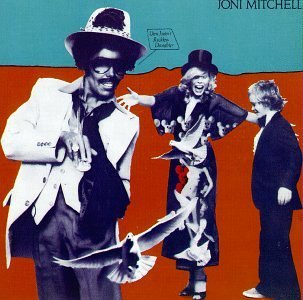
Don Juan's Reckless Daughter is a 1977 double album by Canadian singer-songwriter Joni Mitchell. Her ninth album, it is unusual for its experimental style, expanding even further on the jazz-influenced sound of Mitchell's previous recordings. Mitchell has stated that, close to completing her contract with Asylum Records, she allowed this album to be looser than anything she had done previously.

Clouds is the second album by Canadian singer-songwriter Joni Mitchell, released on May 1, 1969, by Reprise Records. After releasing her debut album, Song to a Seagull (1968), to considerable exposure, Mitchell recorded Clouds at A&M Studios in Hollywood. She produced most of the album and painted a self-portrait for its cover artwork. Clouds has subtle, unconventional harmonies and songs about lovers, among other themes.

Chalk Mark in a Rain Storm is the 13th studio album by Canadian singer-songwriter Joni Mitchell, released on March 23, 1988, by Geffen Records. Her third release on the label, the album features duets with a number of artists such as Peter Gabriel on "My Secret Place," Willie Nelson on "Cool Water," Don Henley on "Snakes and Ladders," and Billy Idol and Tom Petty on the track "Dancin' Clown." Henley also performs backing vocals on "Lakota," and Wendy and Lisa perform backing vocals on "The Tea Leaf Prophecy ."
"Both Sides, Now" is a song by Canadian singer-songwriter Joni Mitchell. One of the first recordings is by Judy Collins, whose version appeared on the US singles chart during the fall of 1968. The next year it was included on Mitchell's album Clouds, and became one of her best-known songs. It has since been recorded by dozens of artists, including Dion in 1968, Clannad with Paul Young in 1991, and Mitchell herself who re-recorded the song with an orchestral arrangement on her 2000 album Both Sides Now.

"Our House" is a song written by British singer-songwriter Graham Nash and recorded by Crosby, Stills, Nash & Young on their album Déjà Vu (1970). The single reached No. 30 on the U.S. Billboard Hot 100 and No. 20 on the Cash Box Top 100. The song, "an ode to countercultural domestic bliss", was written while Nash was living with Joni Mitchell, recording both Crosby, Stills & Nash and Déjà Vu.
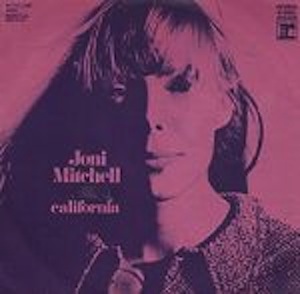
"California" is a song written by Joni Mitchell that first appeared on her 1971 album Blue. It was also released as the second single from the album, as a follow-up to "Carey".
"In France They Kiss on Main Street" is a song by Canadian singer-songwriter Joni Mitchell from the album The Hissing of Summer Lawns. It was released as a single in 1976 and reached number 66 on the Billboard Hot 100. Despite the title referring to kissing in France, the song actually tells a story of young romance and coming of age in the 1950s in North America.
"Country Girl" is a song written by Neil Young that was first released on Crosby, Stills, Nash & Young's 1970 album Déjà Vu.
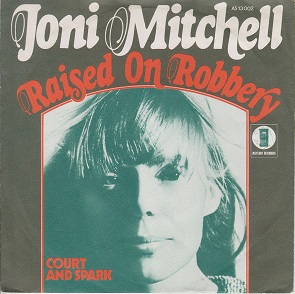
"Raised on Robbery" is a song written by Joni Mitchell. It was the lead single from her 1974 album Court and Spark.
References
- ↑ Bego, Mark (May 26, 2005). Joni Mitchell. Taylor Trade Publications. ISBN 9781589792210.
- 1 2 3 4 5 6 7 8 9 Whitesell, L. (2008). The Music of Joni Mitchell . Oxford University Press. pp. 22, 55, 121, 151, 154. ISBN 9780199719099.
- 1 2 3 4 5 6 7 8 9 10 11 Nelson, S. (2007). Court and Spark. Continuum. pp. 74–80. ISBN 9780826417732.
- 1 2 Smith, L.D. (2004). Elvis Costello, Joni Mitchell, and the Torch Song Tradition. Greenwood. pp. 55–56. ISBN 9780275973926.
- 1 2 3 Bego, M. (2005). Joni Mitchell. Taylor Trade Publications. pp. 8, 128, 134, 153. ISBN 9781589792210.
- ↑ Newman, M. (March 25, 1995). "Joni Mitchell Honored with Billboard Century Award". Billboard Magazine . pp. 1, 88. Retrieved 2015-07-12.
- ↑ Hopper, J. (November 9, 2012). "Joni Mitchell: The Studio Albums 1968-1979". Pitchfork Media . Retrieved 2015-07-12.
- ↑ "Joni Mitchell - Court and Spark". jonimitchell.com. Retrieved 3 January 2022.